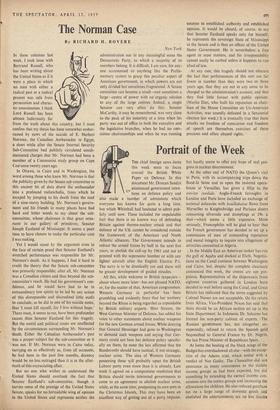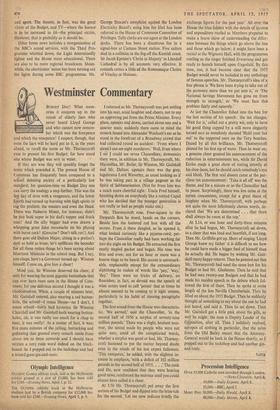Portrait of the Week
THE chief foreign news items this week seem to focus around the British White Paper on Defence. In this document Mr. Duncan Sandys announced government inten- . tions on defence policy and also made a number of admissions which everyone has known for quite a long time, but which Whitehall had hesitated to admit pub- licly until now. These included the unpalatable fact that there is no known way of defending Britain against thermo-nuclear attack and that defence of the UK cannot be considered outside the framework of the American and North Atlantic alliances. The Government intends to reduce the armed forces by half in the next five years, to abolish the call-up by 1961 and not to proceed with the supersonic bomber or with any fighter aircraft after the English Electric P.1. The navy is to be drastically cut and there will be greater development of guided missiles.
All this, while welcome to British taxpayers— about whom more later—has not pleased NATO, or, for the matter of that, American congressmen. Western Germany in particular has been grumbling and evidently fears that her territory beyond the Rhine is being regarded as expendable by British military experts. Herr Strauss, the West German Minister of Defence, has added his voice to other statements about nuclear weapons for the new German armed forces. While denying that General Heusinger had gone to Washington to demand such weapons and saying that Ger- many could not base her defence policy specific- ally on them, he none the less affirmed that the Bundeswehr should have tactical, if not strategic, nuclear arms. The idea of Western Germany possessing these will probably upset the British Labour party even more than it is already. Last week it agreed on a compromise resolution that Britain should invite interested governments to come to an agreement to abolish nuclear arms, while, at the same time, postponing; its own tests in the Christmas Islands. This may' have been an excellent way of getting out of a party impasse, but hardly seems to offer any hope of real pro- gress in nuclear disarmament.
At the other end of NATO the Queen's visit to Paris, with its accompanying trips down the flood-lit Seine and to open the restored opera- house at Versailles, has given a fillip to , the entente cordiale. Ang1O-French fortnights in London and Parishave included an exchange of national delicacies with bouillabaisse flown from Marseilles to Knightsbridge and Parisian diners consuming silverside and dumplings at 19s. a shot—which seems a little expensive. More seriously, Francophiles will be glad to hear that the French government has decided to set up a commission of men of outstanding reputation and moral integrity to inquire into allegations of atrocities committed in Algeria.
t in the Middle East an American tanker has run the gulf of Aqaba and docked. at Elath. Negotia- tions on the Canal continue between Washington and Cairo, but, despite the complete clearance announced this week, the omens are not pro- pitious. Representatives of the shipowners from eighteen ' countries gathered in London have decided to wait before using the Canal, and Great Britain has indicated that the terms suggested by Colonel Nasser are not acceptable. On his return from Africa, Vice-President Nixon has said that there should be an African section set up in the State Department. In Indonesia Dr. Sukarno has formed his non-party cabinet of experts. The Russian government has, not altogether un- expectedly, refused to return the Spanish gold bequeathed to General Franco by Dr. Negrin, the last Prime Minister of Republican Spain.
At home the beating of the black wings of the Budget has, overshadowed allelse—With the excep- tion of the Adams .trial, which ended with a verdict of Not Guilty. The Chancellor did not announce as many concessions to the middle income groups as had been expected, but did something by extending the earned income con- cessions into the surtax groups and increasing the allowances for children. He also reduced purchase tax on a large range of domestic goods and abolished the entertainments tax on live theatre and sport. The theatre, in fact, was the great victor of the Budget, and TV—where the licence is to be increased to £4—the principal victim. However, that is probably as it should be.
Other home news includes a reorganisation of the BBC's sound services, with the Third Pro- gramme whittled down, the Light determinedly lighter and the Home more educational. There are also to be more regional broadcasts. Mean- while, the electricians' union has been turning out the lights during some BBC programmes. Mr. George Strauss's complaint against the London Electricity Board's suing him for libel has been referred to the House of Commons, Committee of Privileges. Tally clerks are out again at the London docks. There has been a disastrous fire in a signal-box at Cannon Street station. Five sailors died in a collision in the fog off the Kentish coast. Sir Jacob Epstein's 'Christ in Majesty' in Llandaff Cathedral is by all accounts very effective. It reminds critics a little of the Romanesque Christs of Vezelay or Moissac.



































 Previous page
Previous page